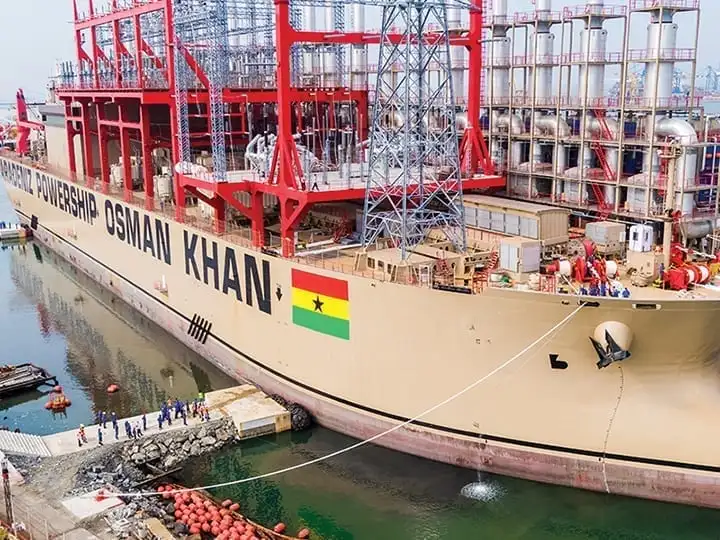Karpowership Ghana Company Limited (KGCL), a Turkish company providing electricity to Ghana, is operating without a Bank Guarantee due to the exhaustion of the previous guarantee under the Akufo-Addo government. This situation arose from the Electricity Company of Ghana’s (ECG) failure to settle a mounting debt, which currently stands at a staggering US$379,004,860.05. Facing this substantial financial burden, KGCL has submitted a proposal to the Ministry of Energy and Green Transition outlining conditions for continued power supply. These conditions include an immediate lump sum payment of US$100 million from ECG, followed by full settlement of the remaining debt within 18 months. Additionally, KGCL seeks a 13% delay fee on the restructured debt, a commitment from ECG to stay current on future invoices, and an extension of the Power Purchase Agreement (PPA) beyond its current expiration date of September 29, 2027. This request for an extension underscores the long-term nature of the partnership KGCL seeks with Ghana, contingent on the resolution of the current financial impasse.
The proposal from KGCL highlights the precarious financial situation surrounding Ghana’s energy supply. While KGCL has reaffirmed its commitment to providing reliable electricity, the company’s ability to do so hinges on ECG’s fulfillment of its financial obligations under the amended 450MW Power Purchase Agreement. The letter from KGCL to the Ministry of Energy and Green Transition makes it clear that the continued operation of the power plant without a Bank Guarantee is dependent on the acceptance of their proposed terms. This implies a significant risk to Ghana’s power supply if a mutually acceptable agreement cannot be reached. The government’s response to this proposal will be crucial in determining the short-term and long-term stability of the nation’s energy sector. The lack of a Bank Guarantee introduces a layer of uncertainty and underscores the urgent need for a sustainable solution.
The ongoing discussions between KGCL, the Ministry of Energy, and ECG are taking place against a backdrop of growing concerns about Ghana’s energy sector and its ability to meet its financial commitments. The potential for a major power crisis looms large, with Karpowership having explicitly warned of a possible shutdown of operations due to the unpaid debt. This warning, issued during a meeting between Energy Minister John Abdulai Jinapor and Karpowership officials, has placed significant pressure on the new administration to find a prompt resolution. The ballooning energy sector debt, exceeding US$3 billion, further complicates the situation and threatens the country’s economic stability. The magnitude of this debt underscores the systemic nature of the problem and suggests that short-term fixes will not be sufficient to ensure long-term stability.
Minister Jinapor has acknowledged the seriousness of the situation and has publicly committed to finding a sustainable solution to address the outstanding financial obligations. His appeal to Karpowership for patience while the government explores payment options highlights the immediate need to prevent a power disruption. However, analysts warn that a shutdown by Karpowership could lead to widespread and prolonged power outages, severely impacting businesses, industries, and households across the country. Such a scenario would have significant economic repercussions and could exacerbate existing challenges faced by Ghanaian businesses and citizens. The potential for a return to “dumsor,” a period of persistent power outages that previously plagued Ghana, is a real concern.
The International Monetary Fund (IMF) has repeatedly identified Ghana’s energy sector debt as a major risk to the country’s economic stability, urging the government to implement urgent reforms. These recommendations include cost-cutting measures to improve operational efficiency, enhanced revenue collection to ensure financial sustainability, and restructuring of power agreements to prevent further debt accumulation. Without these crucial interventions, the IMF warns of a potential collapse of Ghana’s energy sector under the weight of its financial strain, leading to widespread power shortages. This external pressure from the IMF underscores the gravity of the situation and further emphasizes the need for decisive action from the Ghanaian government.
The situation with Karpowership and the mounting energy sector debt represents a significant challenge for the Ghanaian government. Finding a solution that satisfies all stakeholders, including Karpowership, ECG, and the Ghanaian people, is crucial for ensuring the country’s energy security and economic stability. The government must address the underlying issues contributing to the escalating debt, implement the reforms recommended by the IMF, and negotiate a sustainable agreement with Karpowership to prevent a potentially devastating power crisis. The long-term viability of Ghana’s energy sector depends on swift and decisive action to address these complex and interconnected challenges. Failure to do so risks not only immediate disruptions to the power supply but also long-term damage to the nation’s economic prospects.


